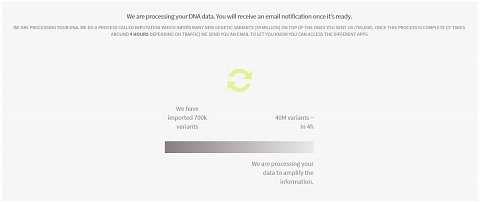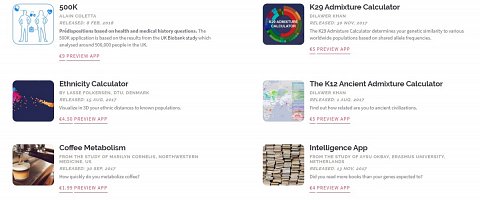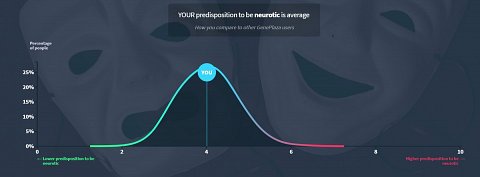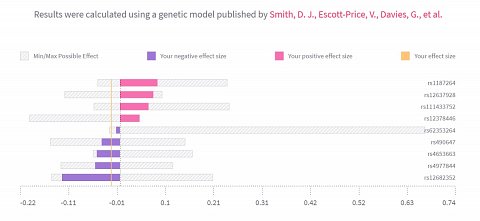-
GenePlaza
review on 17 April 2018
by Rebecca Fishwick

At a Glance
Summary
GenePlaza gave me a means to reuse my genetic information, with a selection of diverse web apps that could analyse my DNA in different ways to tell me more about my genetic predispositions. I thought their range of web apps was fairly decent, and was pleased to see that there were more coming soon.
The prices of their web apps ranged from relatively inexpensive to relatively expensive. However, uploading your DNA or purchasing a kit entitled you to free credit, and so some apps were essentially free, and all the apps were available to me regardless of which option I chose.
Full Review
GenePlaza was founded in January 2017 by Alain Coletta and Robin Duqué. Coletta, the company’s CEO, earned his Ph.D. in bioinformatics from the University of Manchester, UK. Duqué is an industrial engineer, who spent five years building InSilico Genomics SA, a genomic analysis company also founded by Coletta, which closed in 2014 to make way for GenePlaza.
Based in Brussels, Belgium, GenePlaza offers web apps that allow you to use your genetic data to learn more about yourself.
Product Expectations
The GenePlaza website was easy to navigate, and clearly laid out with colourful and dynamic graphics that had a modern and up-to-date feel. The layout was mostly very intuitive, though a few features (the ‘How It Works’, ‘About Us’ and ‘Delivery’ pages) were hidden down the bottom of the page, and so were not self-evident at first glance.
In order to view the web apps offered, I first had to create a free account. I had planned to do this anyway, but it would have been nice to be able to browse the apps first, especially as it turned out that the apps all had to be paid for!
Heading to the FAQs section, I discovered quite a lot of detailed information. Here, I read that the reports generated using my DNA could provide me with “countless” information about myself, including my physical traits, behavioural patterns, the best type of nutrition for me, and information about potential diseases and health issues.
Still, they said that this information was a “statistical approach” and “not a medical analysis”. They advised that the raw data you can download “requires the intervention of a geneticist or health professional” to translate it into understandable data. In other words: don’t go diagnosing yourself.
Regarding their web apps, I read that each one would analyse my DNA to report on specific aspects of my genetic makeup. They said they have a range of different apps, reporting on a number of things from health issues to personality traits. I read that these can cost from nothing to €20; however, once I had access to the list of web apps I could not find any that were currently being offered for free.
There were also step-by-step details about how to purchase and use one of their DNA collection kits, and what would happen to this sample in the laboratory. Though I was planning to upload my genetic data, it was nice to know that this information was provided.
They had provided a help email address, and there was also a live chat feature in the corner of the screen, and so I was confident that it would be easy for me to get help if needed.
Scrolling through the homepage, I found a link to their ‘Blog, News and Press Releases’. However, clicking on this link, I discovered that these were all in French or Dutch, and so it seemed strange to me that this was included on the English version of the site.
Ordering Experience
In order to access Geneplaza’s web apps, I had to create a free account. This was very straightforward. I entered my name and email address, and had to agree to the Terms and Conditions and Privacy Policy. These were both shown in full, with a short summary at the top (obviously anticipating that a lot of people wouldn’t read them!). This summary was the same for both: “Bottom line: we will not sell your data to anyone ever. Period. All data sharing is done under your own terms. No exceptions.”
Looking through the Terms and Conditions, it seemed they had been written with the customer in mind, with postal and email addresses for getting in touch and clear definitions of the terminology. I learned that in order to share information with Geneplaza, I must be over 18. I could also choose to contribute to research in human genetics by sharing data with the company’s scientific partners.
There was more about this in the Privacy Policy: if I sent in a DNA sample and agreed to participate in research projects, then my sample would be kept for use by any future studies. This data would not be shared with any third parties, excepting Geneplaza’s subcontractors.
I read that Geneplaza may also disclose my personal data in order to comply with the law, protect the company’s own rights, or if justified by “compelling circumstances” to protect the safety of their users, Geneplaza and their partners, or the public. Regarding my own rights, I could request that any incorrect data of mine be corrected, and withdraw consent to my genetic and health data being used at any time, without justification. I could also object to how my data might be used; for instance, if it was being used for direct marketing.
Having read the Terms and Conditions and Privacy Policy, and finding them straightforward and reasonable, I was happy to agree to both.
Once I’d created my account, I could upload my genetic data from Ancestry DNA, 23andMe or Gencove. Alternatively, I could order or register a saliva kit from GenePlaza.
I already had a copy of my DNA, so I chose to upload this file.
Data Upload
Clicking on the link to upload my data, I found there were links to download raw data from Ancestry DNA and 23andMe, and to import data from Gencove.
I uploaded my 23andMe file. The initial upload took less than a minute, but I then had to wait for this data to process – which they estimated would take four hours!

My data processing screen.
I was told that they were processing my DNA using “imputation”, which would “infer many new genetic variants”. This meant they were filling in gaps in my DNA profile provided by 23andMe in order to fill out my genome.
I found that choosing to upload my data had given me €3 in credit (Euros were used even on the English version of the site). Had I chosen to purchase a kit, I would have been awarded €6. They specified that this credit was only eligible to purchase certain apps.
Before I could purchase any web apps, I had to wait for my data to finish processing. In the meantime, I was able to browse their store.

A selection of the web apps available in the GenePlaza store.
The web apps they offered varied quite a bit in price. I was unsure whether this reflected the newness, quality or comprehensiveness of each app. There was also a range in the type of services each app offered: some, like the ‘My Weight’ app, were health-oriented, while others were more focussed on personality, such as the ‘Intelligence App’ and the ‘Are You Predisposed to Neuroticism?’ app. There were also apps for discovering your ancestry, such as the ‘K12 Ancient Admixture Calculator’, the ‘K29 Admixture Calculator’, the ‘Ethnicity Calculator’, and the simply named ‘Ancestry’ app.
My eye was caught by the ‘Are You Predisposed to Neuroticism?’ web app, which had been developed from the study of Naomi Wray of the Queensland Institute of Medical Research, Australia. I decided I would try this one once my data processing was complete.
Clicking on ‘Preview App’, I was shown a sample of what my report might look like, which included a definition of what was meant by “neuroticism”, a graph showing how predisposed to neuroticism the general population is, information about the Eysenck Personality Questionnaire (which defined Neuroticism vs. Stability as one of the two main aspects of a person’s temperament), and links to reference papers.
Three hours later, I received an email saying that my DNA had finished processing, and so I headed over to the site to download the ‘Are You Predisposed to Neuroticism?’ web app.
The Results
Purchasing the web app was very straightforward. As I had been given €3 credit, I did not have to go through a checkout process (I saw that they accept PayPal, Visa, Mastercard, American Express, Discover and Stripe).
As soon as I confirmed my purchase, I was directed to a loading screen. This told me my results were being calculated, and I would receive an email once they were ready. The estimated time for this was two to thirty minutes.
I found the abruptness of this quite startling. I had expected that there would be some sort of survey first, and that my answers to these questions would be compared with my calculated genetic predisposition.
About two minutes later, my results were ready.
Results Section: ‘Are You Predisposed to Neuroticism?’
As in the sample report, the first thing that greeted me on my results page was a definition of “neuroticism”. This was littered with links to Wikipedia articles, which defined just about every word in their definition (shown below).

Their definition of “neuroticism”. The words in green are links to Wikipedia articles.
I learnt that neuroticism is one of the “Big Five” personality traits, and that individuals who score high on neuroticism are more likely to be moody, and to suffer from anxiety, worry, fear, anger, frustration, envy, jealousy, guilt, depressed mood and loneliness.
Reading that, I hoped I wouldn’t score too highly.
Scrolling down, I discovered that my predisposition to neuroticism was “average”, which seemed reasonable enough to me. There was a graph showing how my neuroticism level compared with the other GenePlaza users, which had me placed squarely in the middle (shown below).

A graph showing my neuroticism score compared to other users’.
As I’d seen in the sample report, there was information about the Eysenck Personality Questionnaire. Here, I read how behavioural psychologist Hans Eysenck (who gave his name to the questionnaire) had believed that personality grew out of learned habits, but also genetic predisposition. Eysenck was largely concerned with “temperament”: the aspect of our personalities that is genetically based. He believed that temperament had two dimensions: E for Extraversion vs. Introversion, and N for Neuroticism vs. Stability. His questionnaire placed people along these two dimensions.
I read that the developers of the web app had decided not to use a questionnaire in order to prevent the results being skewed by a lack of truth on the part of the taker, or a lack of understanding of the questions. It occurred to me that the creators must have been very confident in the accuracy of their results to have done away with a questionnaire altogether, even as a means of comparison to the result generated using DNA analysis.
Still, perhaps their confidence was not misplaced. Scrolling further down the page, I found a graph showing the genetic variants in my DNA that they had used in order to create my neuroticism score (shown below).

A graph showing the genetic variants analysed to generate my neuroticism score.
Basic as my understanding of the graph was, I was impressed by how transparent they were about what they had actually analysed to achieve my result. Had I wanted to, I could have read the paper they had referenced, or looked up the individual genetic variants listed to discover more about them.
Below, was an explanation of the graph. I found this quite dense, and was surprised by how little they explained scientific terms (they called genetic variants “SNPs”, and referred to “alleles” without any explanation). I found this surprising, as up until this point their content had been relatively simple and easy to understand without specialist knowledge.
At the bottom of the page, there were references to other academic papers.
As I scrolled up and down the page, I was followed by a banner wanting my opinions on two things: whether I considered the predictions “true”, and whether “these questions” were interesting. I wasn’t sure which questions were meant, since these two were the only ones I had been asked! For the second question, I opted for “Slightly interesting” (to deter fence-sitters, there was no “neutral” answer). I was glad I’d been asked my opinion on the app’s neuroticism prediction, since this might contribute to making it more accurate in the future.
As for their prediction of my own neuroticism score, I decided that I was “Totally happy” with the result. After all, an average predisposition to neuroticism seemed a reasonable enough!
Marketplace Experience
Returning to the web app store, I noticed that there was a ‘Coming Soon’ section showing which apps would soon be available. There was also the option to vote on upcoming web apps, with a short summation of each one, and plenty of options to choose from. Among these were a ‘Diet and Exercise’ app, a ‘Personality Profiles’ and an ‘Energy’ app to show how your DNA affects your metabolites. Allowing users to vote on what the next two web apps would be struck me as a good idea, since they would be the ones purchasing and using them.
It was unclear to me whether the web apps were created by Geneplaza, or by their external partners. The ‘Are You Predisposed to Neuroticism?’ web app was said to be “from the study of Naomi Wray, Queensland Institute of Medical Research, Australia”. I was unsure whether this meant that she developed it, or that it was developed by Geneplaza or someone else using her research.
Browsing the site, I discovered that there was a ‘Referral Programme’, where those who had bought their DNA testing kit from GenePlaza could refer their friends, and receive compensation (up to the value of one kit). Since I hadn’t spent money on a kit, I didn’t mind missing out on this. Clicking on my email address at the top, I saw there was a ‘My Referrals’ section, where referral information would be listed.
I could also edit my account settings, where I could enter my full name and address (possibly for billing purposes?), verify my email, change my password, download my raw DNA file (which first required email validation), or close my account. Closing my account would lead to GenePlaza removing all genetic information in my account, and discarding my sample (if they had it) within 15 days of receiving my request.
Summary
GenePlaza gave me a means to reuse my genetic information, with a selection of diverse web apps that could analyse my DNA in different ways to tell me more about my genetic predispositions. I thought their range of web apps was fairly decent, and was pleased to see that there were more coming soon.
The prices of their web apps ranged from relatively inexpensive to relatively expensive. However, uploading your DNA or purchasing a kit entitled you to free credit, and so some apps were essentially free, and all the apps were available to me regardless of which option I chose.
Visit GenePlaza to learn more about this DNA testing service >


